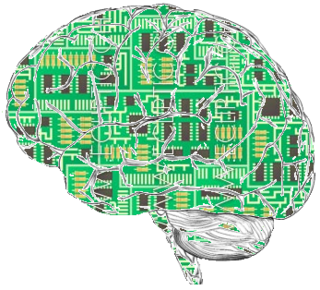In the field of computer science, artificial intelligence (AI), sometimes called machine intelligence, is intelligence demonstrated by machines, in contrast to the natural intelligence displayed by humans and other animals. Computer science defines AI research as the study of "intelligent agents": any device that perceives its environment and takes actions that maximize its chance of successfully achieving its goals. More specifically, Kaplan and Haenlein define AI as “a system’s ability to correctly interpret external data, to learn from such data, and to use those learnings to achieve specific goals and tasks through flexible adaptation”. Colloquially, the term "artificial intelligence" is applied when a machine mimics "cognitive" functions that humans associate with other human minds, such as "learning" and "problem solving".

Cognitive science is the interdisciplinary, scientific study of the mind and its processes. It examines the nature, the tasks, and the functions of cognition. Cognitive scientists study intelligence and behavior, with a focus on how nervous systems represent, process, and transform information. Mental faculties of concern to cognitive scientists include language, perception, memory, attention, reasoning, and emotion; to understand these faculties, cognitive scientists borrow from fields such as linguistics, psychology, artificial intelligence, philosophy, neuroscience, and anthropology. The typical analysis of cognitive science spans many levels of organization, from learning and decision to logic and planning; from neural circuitry to modular brain organization. The fundamental concept of cognitive science is that "thinking can best be understood in terms of representational structures in the mind and computational procedures that operate on those structures."
The Chinese room argument holds that a program cannot give a computer a "mind", "understanding" or "consciousness", regardless of how intelligently or human-like the program may make the computer behave. The argument was first presented by philosopher John Searle in his paper, "Minds, Brains, and Programs", published in Behavioral and Brain Sciences in 1980. It has been widely discussed in the years since. The centerpiece of the argument is a thought experiment known as the Chinese room.

The mind is a set of cognitive faculties including consciousness, perception, thinking, judgement, language and memory. It is usually defined as the faculty of an entity's thoughts and consciousness. It holds the power of imagination, recognition, and appreciation, and is responsible for processing feelings and emotions, resulting in attitudes and actions.
The technological singularity is the hypothesis that the invention of artificial superintelligence (ASI) will abruptly trigger runaway technological growth, resulting in unfathomable changes to human civilization.

Whole brain emulation (WBE), mind upload or brain upload is the hypothetical futuristic process of scanning the mental state of a particular brain substrate and copying it to a computer. The computer could then run a simulation model of the brain's information processing, such that it responds in essentially the same way as the original brain and experiences having a conscious mind.
Sentience is the capacity to feel, perceive or experience subjectively. Eighteenth-century philosophers used the concept to distinguish the ability to think (reason) from the ability to feel (sentience). In modern Western philosophy, sentience is the ability to experience sensations. In Eastern philosophy, sentience is a metaphysical quality of all things that require respect and care. The concept is central to the philosophy of animal rights because sentience is necessary for the ability to suffer, and thus is held to confer certain rights.
"Computing Machinery and Intelligence" is a seminal paper written by Alan Turing on the topic of artificial intelligence. The paper, published in 1950 in Mind, was the first to introduce his concept of what is now known as the Turing test to the general public.

The Emperor's New Mind: Concerning Computers, Minds and The Laws of Physics is a 1989 book by mathematical physicist Sir Roger Penrose.
A reverse Turing test is a Turing test in which the objective or roles between computers and humans have been reversed.
An artificial brain is software and hardware with cognitive abilities similar to those of the animal or human brain.
Artificial intelligence has close connections with philosophy because both share several concepts and these include intelligence, action, consciousness, epistemology, and even free will. Furthermore, the technology is concerned with the creation of artificial animals or artificial people so the discipline is of considerable interest to philosophers. These factors contributed to the emergence of the philosophy of artificial intelligence. Some scholars argue that the AI community's dismissal of philosophy is detrimental.

Mind uploading, whole brain emulation or substrate-independent minds is a use of a computer or another substrate as an emulated human brain, and the view of thoughts and memories as software information states. The term mind transfer also refers to a hypothetical transfer of a mind from one biological brain to another. Uploaded minds and societies of minds, often in simulated realities, are recurring themes in science fiction novels and films since 1950s.
Life on the Screen: Identity in the Age of the Internet is a book by clinical psychologist and professor Sherry Turkle. It addresses how people interact with computers, and consequences of that interaction. It was first published in November 1995. Turkle explains how peoples' opinion of computers have evolved through time and some of the implications for new users.
POV most commonly refers to:

Anthropomorphism is the attribution of human traits, emotions, or intentions to non-human entities. It is considered to be an innate tendency of human psychology.

The Turing test, developed by Alan Turing in 1950, is a test of a machine's ability to exhibit intelligent behavior equivalent to, or indistinguishable from, that of a human. Turing proposed that a human evaluator would judge natural language conversations between a human and a machine designed to generate human-like responses. The evaluator would be aware that one of the two partners in conversation is a machine, and all participants would be separated from one another. The conversation would be limited to a text-only channel such as a computer keyboard and screen so the result would not depend on the machine's ability to render words as speech. If the evaluator cannot reliably tell the machine from the human, the machine is said to have passed the test. The test results do not depend on the machine's ability to give correct answers to questions, only how closely its answers resemble those a human would give.

DeepMind Technologies is a British artificial intelligence company founded in September 2010, currently owned by Alphabet Inc. The company is based in London, with research centres in Canada, France, and the United States.







